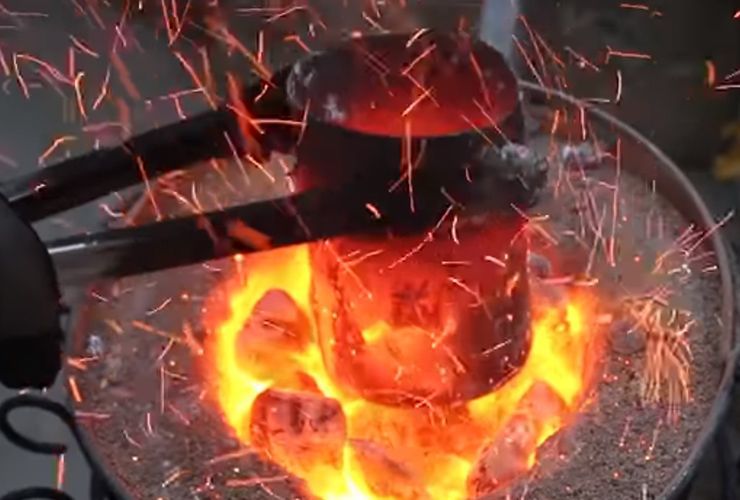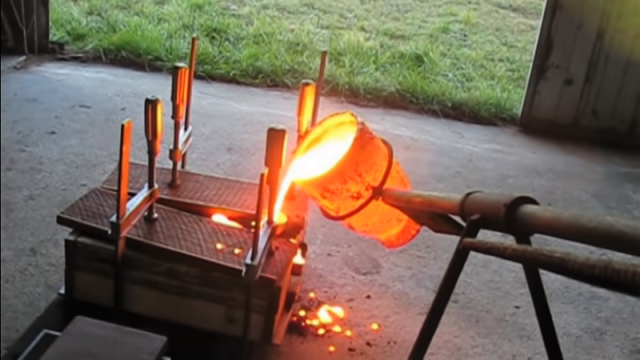Proven Strategies to Achieve High-Quality Aluminum Casting Results
A Comprehensive Guide to Metal Casting: Advantages and Services Used by Foundries
Metal casting is a vital process in different industries, providing numerous advantages via the services of factories. These facilities transform liquified metal into durable and accurate components, satisfying particular client demands. By employing sophisticated technologies, factories guarantee quality and effectiveness in manufacturing. Nonetheless, the ins and outs of metal casting and the varied techniques involved increase essential questions concerning its function in modern-day production. What technologies exist in advance in this crucial area?
Recognizing the Metal Casting Process
The metal casting process is a fundamental technique utilized in making to develop intricate forms and parts. This approach includes pouring molten metal right into a mold designed to create the preferred object. The procedure starts with pattern creation, which works as a layout for the mold. Aluminum Foundry. Numerous products, such as sand, metal, or ceramic, are used for mold-making, relying on the certain requirements of the casting
As soon as the mold is ready, molten metal is put right into it and allowed to cool down and solidify. After solidification, the mold is removed, disclosing the cast component. Different techniques, including sand casting, financial investment casting, and die casting, are utilized, each suited to various applications and products. Quality control actions, such as examinations and testing, are essential to ensure the end product fulfills specs. Overall, the metal casting process plays a vital role in producing components for sectors ranging from vehicle to aerospace.
Trick Advantages of Metal Casting
Metal casting uses significant benefits that make it a recommended manufacturing technique in different industries. Its style versatility and accuracy permit elaborate forms, while cost-efficient mass manufacturing enhances effectiveness. In addition, the convenience and strength of materials utilized in casting add to the sturdiness of the end products.
Style Flexibility and Precision
Releasing impressive design versatility and accuracy, metal casting allows developers and designers to create elaborate shapes and attributes that would certainly be difficult or difficult to achieve with other producing methods. This capability enables the manufacturing of complex geometries, interior structures, and great information that enhance product performance and looks. Additionally, various casting methods, such as sand casting, financial investment casting, and die casting, offer more choices for customization, accommodating diverse material buildings and project demands. The versatility of molds permits alterations throughout the style phase, streamlining the change from idea to final product. Ultimately, metal casting stands apart for its ability to supply high-precision elements, making it a vital process in industries varying from automobile to aerospace and past.
Economical Automation
Economical mass manufacturing stands as one of the main benefits of metal casting, allowing manufacturers to create large amounts of components at a reduced expense per device. This effectiveness occurs from the ability to create complex molds that can be reused numerous times, significantly minimizing setup and operational prices. Additionally, metal casting procedures, such as sand casting and die casting, allow for high throughput, making it viable to satisfy the demands of large manufacturing runs. The reduced product waste and energy intake even more improve price savings, making metal casting an eye-catching option for markets requiring bulk elements. Overall, the economical nature of metal casting placements it as a preferred technique for manufacturers intending for financial effectiveness in their manufacturing processes.
Material Adaptability and Strength
One of the standout attributes of metal casting is its impressive material adaptability, which enables using a variety of alloys and steels. This flexibility enables producers to choose products that finest suit their certain applications, from light weight aluminum and bronze to iron and steel. Each metal supplies unique buildings, consisting of differing degrees of stamina, corrosion resistance, and thermal conductivity. Metal casting can generate elements that meet rigorous efficiency requirements across diverse markets, such as vehicle, aerospace, and building and construction. Additionally, the strength of cast metals can be improved with numerous treatment procedures, guaranteeing toughness and long life. Metal Casting. On the whole, the mix of product versatility and inherent stamina makes metal casting a recommended option for creating high-grade elements
Kinds Of Metal Casting Techniques
Metal casting encompasses a variety of techniques that deal with various manufacturing demands and product properties. Usual techniques include sand casting, which makes use of a sand mold for complicated forms, and investment casting, understood for its precision and surface coating. Pass away casting is one more technique that utilizes high-pressure injection of liquified metal into mold and mildews, ideal for automation of little components.
Shell molding supplies a quicker different, utilizing a resin-coated sand to produce thin-walled mold and mildews, while lost foam casting enables elaborate layouts without the need for a core.
In addition, continuous casting is used for producing long areas of metal, such as bars or sheets, by strengthening liquified metal in a constant process. Each method offers unique benefits and is picked based on elements like the called for detail, production quantity, and product kind, guaranteeing exceptional end results in metal construction throughout different sectors.
The Function of Foundries in Metal Casting
Shops play an essential duty in the metal casting process, offering as the facilities where liquified metal is changed into ended up products. These specialized facilities are geared up with the essential tools and innovations to take care of different steels, making sure premium outcomes. Factories are in charge of several critical functions, including melting the metal, putting it right into mold and mildews, and permitting it to strengthen.
Furthermore, they preserve stringent security and ecological requirements to secure employees and lessen environmental effect. Knowledgeable technicians and engineers team up to optimize casting processes, enhancing effectiveness and lowering waste. Shops additionally take part in high quality control steps, guaranteeing that the final items fulfill certain tolerances and requirements. This quality control is important for industries that count on precise components, such as automobile and aerospace. Consequently, foundries contribute substantially to the overall manufacturing landscape, enabling innovation and growth throughout numerous fields.
Personalized Metal Casting Providers
Personalized metal casting solutions use customized layout solutions that meet details customer needs. These services likewise provide material option expertise, ensuring the appropriate metal is picked for the wanted application. Such flexibility and understanding enhance the general quality and performance of the final product.

Customized Layout Solutions
Customized layout remedies in metal casting give suppliers with the flexibility to create components that fulfill particular efficiency and visual needs. Factories offer personalized services that enable clients to define dimensions, shapes, and surface area finishes to attain desired results. This customization procedure commonly includes cooperation in between engineers and designers, making certain that the end products line up with operational needs and sector criteria. Advanced modern technologies, such as computer-aided style (CAD) and simulation software program, enable precise modeling and testing of parts before manufacturing, lessening errors and enhancing efficiency. By leveraging tailored layout services, companies can optimize capability while decreasing waste and costs, inevitably causing a more one-upmanship on the market. This adaptability is important for industries calling for special applications and specs.
Material Selection Know-how
When choosing materials for metal casting, competence plays a vital function in guaranteeing that the best choice straightens with both efficiency needs and cost-effectiveness. Factories utilize experienced professionals that comprehend the residential properties of various metals and alloys, permitting them to recommend suitable products for particular applications. Variables such as strength, deterioration resistance, and thermal conductivity are thoroughly taken into consideration to meet the client's requirements. In addition, industry trends and improvements in product science educate these choices, enabling shops to remain competitive. By leveraging their proficiency, shops can help customers in steering via complicated material choices, eventually bring about boosted item quality and reduced manufacturing prices. This specialized knowledge is vital for accomplishing successful results in custom-made metal casting solutions.
High Quality Control in Metal Casting
Quality assurance in metal casting is critical to assure that the end products satisfy the called for specifications and performance standards. Foundries use a selection of strategies and methodologies to assure the greatest top quality of actors components. This process starts with rigorous material evaluations, validating that basic materials follow market requirements. Throughout the casting procedure, real-time surveillance and testing are conducted to evaluate specifications such as temperature level, mold and mildew honesty, and dimensional accuracy.

Applications of Metal Castings Across Industries
Metal castings play an important function in numerous markets, serving as the backbone for many applications. In the vehicle market, cast components such as engine blocks and transmission real estates are needed for lorry efficiency and integrity. The aerospace sector relies upon accuracy spreadings for essential parts that assure safety and security and performance in trip. Furthermore, the building and construction market utilizes metal castings for components, fittings, and architectural components, improving the resilience of buildings and infrastructure.
The power sector benefits from castings made use of in wind turbine blades and other tools crucial for power generation. The clinical field likewise uses metal castings in tools and gadgets, demonstrating the convenience of this production process. On the whole, metal castings are integral to the performance and development of varied markets, showcasing their importance in modern-day innovation and facilities development
Regularly Asked Questions
What Products Are Typically Made Use Of in Metal Casting?
Usual products utilized in metal casting include aluminum, iron, bronze, brass, and steel. Each product provides distinct residential properties appropriate for different applications, permitting makers to choose the finest option based on weight, rust, and toughness resistance.
How much time Does the Metal Casting Refine Usually Take?
The metal casting procedure generally takes a number of hours to a couple of days, relying on variables such as the complexity of the design, type of metal utilized, and the details casting approach utilized by the factory.
What Is the Ecological Effect of Metal Casting?
The ecological influence of metal casting consists of power consumption, emissions, and waste generation. Factories commonly apply actions to mitigate these effects, such as recycling materials and utilizing cleaner technologies to decrease their environmental footprint.
Can Metal Casting Be Done for Small-Scale Projects?
Metal casting can undoubtedly be performed for small projects. Various foundries accommodate such needs, providing customized services that accommodate limited manufacturing runs while keeping top quality and accuracy in the final products.
What Are the Safety Actions in Metal Casting Foundries?
In metal casting shops, safety and security procedures include personal safety tools, appropriate ventilation, training on equipment usage, emergency situation procedures, routine upkeep checks, and adherence to market security standards to decrease threats connected with molten metal and unsafe materials.
Furthermore, metal casting procedures, such as sand casting and pass away casting, permit for high throughput, making it feasible to meet the demands of massive manufacturing runs. One of the standout features of metal casting is its remarkable product adaptability, which allows for the usage of a large range of alloys and metals. In addition, constant casting is utilized for creating long areas of metal, such as bars or sheets, by strengthening molten metal in a continual process. Shops play a critical role in the metal casting process, offering as the centers where liquified metal is transformed into completed products. Usual materials utilized in metal casting include aluminum, iron, brass, bronze, and steel.